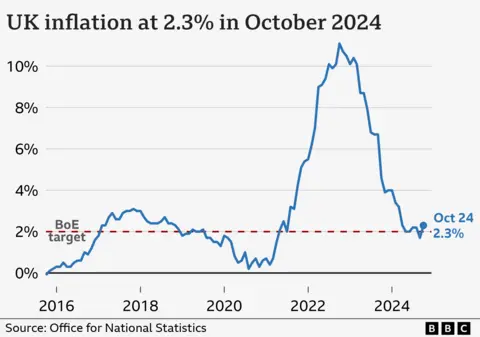 Getty Images
Getty ImagesA rise in energy bills has pushed UK inflation to its highest rate for six months.
The inflation rate, which measures price changes over time, rose by more than expected to 2.3% in the year to October, up from 1.7% in September.
Annual gas and electricity bills for a typical household went up by about £149 last month although prices are rising much more slowly than in recent years.
The latest inflation figure comes after the government revealed that an additional 50,000 pensioners will be living in relative poverty next year as a result of cuts to the winter fuel allowance.
Higher inflation pushes up the cost of living for households, and can lead to interest rates remaining at a higher level, making the cost of loans, credit cards and mortgages, more expensive.
Inflation has fallen from its peak in October 2022. Prices are not falling, but are now rising less quickly.
However, there are concerns the cost of living will rise further, with firms warning they will raise prices to cover new taxes in the Budgt and, due to potential trade taxes imposed by the US, with Donald Trump pledging a 20% tariff on all imports.

Some charities have already voiced concerns about how less well-off households will cope during the colder months. In September, the government announced the £300 winter fuel payment would be means-tested for all but the poorest pensioners.
It comes as other help for those struggling to pay energy bills has been scaled back.
With temperatures dropping to freezing levels this week, the cost of heating is likely to become a concern for many households.
Although there has been a jump in electricity and gas costs, energy prices are still lower than last winter and the winter before. People using a typical amount of gas and electricity are currently paying £1,717 under the energy price cap, which is set by the regulator Ofgem.
The cap fixes the maximum price paid for each unit of energy across Britain. Different rules apply in Northern Ireland.
Derek Lickorish, chairman of energy supplier Utilita, said he had seen a 60% increase in customers asking the company for help with bills.
“Now it’s really cold, that figure is going to be even higher,” he told the BBC, adding that people were “running on empty” after being hit with rising costs through the pandemic and energy crisis.
While higher energy costs drove inflation higher last month, the increase was offset by falls in live music and theatre ticket prices, as well as a drop in raw material prices for businesses.
Inflation in the services sector, which measures price rises for things such as haircuts, airfares and hotels, ticked up to 5%, but food price inflation remained unchanged.
However, prices for staples such as cheddar cheese, baking potatoes and butter have all gone up in the last 12 months.
‘Costs up left, right and centre’
Julie Kleeman, co-owner of restaurant Taste Tibet in Oxford, said there were “limits” to what she could do to avoid putting prices up to counter rising costs.
“We’re just seeing costs going up left, right and centre and it’s been this way ever since Covid,” she told BBC Radio 5Live.
“This time of year we’re seeing footfall slow down, that’s normally our busiest.”
Darren Jones, chief secretary to the Treasury, said the government knew “families across Britain are still struggling with the cost of living”, but told the BBC that it was “good news” inflation was “stable”.
Interest rates were cut to 4.75% two weeks ago, but experts suggest they will not be cut again until next year. The last time inflation was at 2.3% – above the Bank of England’s target – was in April.
Shadow chancellor Mel Stride said claimed Labour’s Budget would “push up inflation and mortgage rates”.
Fiona Cincotta, a financial market analyst, pointed out that the “hotter” than expected inflation rate comes after the Bank of England has “already warned that rates may be cut at a slower pace”.
Andrew Bailey, the Bank’s governor, reiterated on Tuesday, that the Bank would take a “gradual” approach to cutting interest rates after warnings that Budget tax rises and the threat of Trump tariffs could drive prices up at a faster rate
Russ Mould, investment director at AJ Bell, said policymakers could argue inflation at 2.3% is still “relatively low”, but he added households were still feeling the impact of price rises over the last few years.

How to keep energy use – and bills – down
- If your hot water is too hot to wash your hands in, then your setting is too high so turn the boiler down
- Manage your draughts, such as putting a black bag with scrunched up paper up an unused chimney, or limit other draughts around the home
- Limit time in the shower to four minutes. The charity WaterAid has compiled a playlist of four-minute songs to keep you to time
